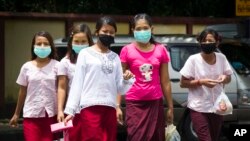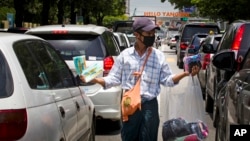Myanmar’s government has repeatedly appealed for calm in recent weeks as the death toll from an outbreak of swine flu, or H1N1 influenza, has risen to 14 since the first cases were reported last month.
Officials have pointed to the fact that the strain of the virus, which was part of a global pandemic in 2009 that originated in pigs, is now considered a normal seasonal flu, and infections – if not deaths – have occurred in the country as recently as last year.
But a lack of faith in the Myanmar government’s ability to handle a health crisis and a seemingly slow initial response have nevertheless created a disconnect, allowing an atmosphere of mistrust to prevail and pushing many to take matters into their own hands.
Companies have given surgical face masks to employees, while some entrepreneurs are even selling them on the internet.
Educating the public
Activist Thet Swe Win was one of many volunteers to take part in an awareness effort over the weekend on the streets of Yangon that consisted informing members of the public to wash their hands and wear masks when outdoors.
“The reason for doing this campaign is that our government is not announcing any accurate information about this and people are afraid,” he said.
The government, however, disputes allegations of passivity and obfuscation.
Dr. Than Htun Aung, the deputy director of the public health department with Myanmar’s Ministry of Health and Sports, said the government has made announcements and continued to share protection methods while collaborating with the World Health Organization.
“We did risk assessments about this, and responded rapidly to the patients, whether they were severely diagnosed or not,” he said. “We have to wait and see to tell whether it will get larger or disappear.”
The government has also recommended avoiding crowded places, hand washing and recognizing tell-tale symptoms as some of the first lines of defense rather than emphasize the use of face masks, which have not proven to be an always reliable safeguard against the virus.
Dr. Than Htun Aung said that people don’t understand how influenza is spread, and they panicked because “they didn’t get correct information about this.”
He did not specify what details were wrong or where they were being disseminated, except to say that “social media and media are responsible for providing correct information to people.”
Response to outbreak
The ministry says in the last 10 days of July there were 62 confirmed cases of H1N1, with 12 deaths. The heightened sense of alert led the city of Mandalay to cancel an annual spirit festival that was supposed to start a few days ago. Local media reported a 14th fatality this week and a slight uptick in infections. Adding to some of the confusion there was a separate outbreak of bird flu on a farm in southern Myanmar late last month.
But the disconnect in information and urgency surrounding H1N1 is understandable, perhaps even expected.
Myanmar’s health system was neglected for decades under military rule, and some services today, from ambulance drivers to burials, rely on an army of volunteers or NGOs to make up for a lack of human resources and emergency response.
Anthony Quick, an executive advisor to M-EMS, a company that works on pre-hospital care and training in Myanmar, said in an email that “as is the case with almost any type of outbreak or disease in Myanmar, the current health facilities are not yet fully adequate to meet the demands of the general population,” which could cause some “difficulties and mistrust.”
“This is not to say that the current providers we have now are not doing their job to the best of their ability,” he said, adding that they can feel overwhelmed.
Dr. Amaya Maw Naing, a public health specialist and one of the advisers to the Myanmar Red Cross Society, said that uncertainty around government awareness efforts is common in similar circumstances.
“In every country we are very worried that people will also think there is something they [the government] are hiding and they are not telling us,” she said.
She described the government's activity as proactive, citing knowledge of cross-coordination efforts in Yangon and other states and divisions.
“So if these kind of measures continue I think that we will be able to overcome higher numbers of deaths,” she said.





